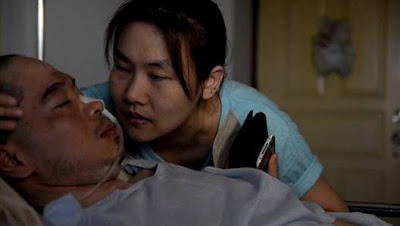- Directed by Kongkiat Komsiri
- Starring Krissada Sukosol Clapp, Somchai Khemglad, Kritsada Suphapphaphrom, Sakrin Suthammasamai
- Released in Thai cinemas on June 14, 2012; rated 18+
- Wise Kwai's rating: 5/5
With Martin Scorsese now off making family-friendly 3D movies, a new director has arisen to take over Scorsese's old territory in the making of gritty, violent and stylish gangster movies: Kongkiat Komsiri.
The writer-director's latest effort Antapal (อันธพาล) echoes such Scorsese movies as Mean Streets, Goodfellas and Gangs of New York as well as old-time Thai action films. It's also a continuation of the thread of crime movies Kongkiat started with the underground boxing drama Muay Thai Chaiya and the serial-killer thriller Slice.
Antapal is a story previously told in 1997's Dang Bireley's and Young Gangsters (2499 Antapan Krong Muang), the debut feature by Nonzee Nimibutr (scripted by Slice scribe Wisit Sasanatieng) that's hailed as the first "Thai New Wave" film that helped elevate the Thai film industry out of the doldrums and bring Thai cinema to the world stage.
Kongkiat has adamantly said that it isn't a remake or a sequel and he gets angry at anyone who suggests otherwise. But there's nothing wrong with making a remake or sequel as long as it's a good film, and Antapal is great. The character names are the same, but the story is greatly expanded, with more of an epic feel. It's also a fact-based tale, and there are documentary-like segments in which old-timers from the era are interviewed and talk about the young gangsters of 1950s and '60s Thailand.
While Nonzee's version focused on Dang Bireley, Antapal, which translates literally as "hoodlum", casts Dang's friend Jod as the main protagonist.
Jod is portrayed by Krissada Sukosol Clapp, the pop singer and hotel-chain heir who previously gave a critically hailed performance in 13: Game of Death. In Antapal he exudes charisma as the humbly quiet and brooding gangster who explodes with rage when such emotion is needed.
Early on, he duels with an older gangster, played by perennial heavy Pongpat Wachirabunjong, in a knife fight in which the combatants are tied to each others' arms with a rope. They then use their one free hand to slash at each other with big blades. Later, at a big dinner, he uses a crab claw to stab a guy in the jugular. Another time, he uses a homemade firearm to shoot a rival, with the old-timers explaining that it was a game-changing act, marking the first time guns were used in the Thai gang world. Before then, gangsters had only carried knives. And even later, Jod comes out with a machine gun blazing – a solo Butch and Sundance making his last stand.
Somchai Kemglad portrays Dang, the hot-headed leader of the gangsters, but he's quickly and unceremoniously sidelined and then the movie mainly follows Jod's story.
Watching from the sidelines are a couple of young guys, PIak and Tong (Kritsada Suphapphaphrom and Sakrin Suthammasamai) who idolize Dang and Jod and aspire to be gangsters just like them. The pair live in the back room of a movie theater and spy on the older gangsters while they watch movies starring James Dean and Elvis Presley. The youngsters also slick back their hair and dress like the screen icons.
A military coup brings new order to the streets. A crackdown on the mafia sends most of the gangsters to prison or into exile as the junta takes over all their rackets, including protection of such criminal enterprises as gambling dens, prostitution and smuggling. In the young gangsters' neighborhood, it's a uniformed officer named Neung (Wasu Saengsingkaeo) who rules like a dictator and is a frequent thorn in the side of Jod's gang.
Jod emerges from prison a changed man, with a determination to set things right. But, knowing no other life, he returns to his old gangster ways with his old crew, which the new kids have joined.
Amidst beefing with rival gangs and paranoia over a possible mole within their ranks, Jod's new gang quickly unravels. One suspected informant is buried in a sugar-cane field, bringing to mind the cornfield burial scene in Scorsese's Casino.
And the lifelong friendship between blood brothers Piak and Tong is torn asunder when Piak, heedless of his pal's warnings, falls for a girl (doe-eyed Nantana Chaowarat) who is the mistress of their gang's boss.
Aside from the strong performance by Noi Sukosol, Kongkiat coaxes great performances from a couple of fellow directors who've been cast in supporting roles. Director Pornchai "Mr. Pink" Hongrattanaporn is reunited with his Bangkok Loco star, playing opposite Noi as he portrays the stylishly dressed boss of Jod's crew. Boonsong Nakphoo, who during the same week Antapal opened had his latest low-budget rural drama Four Stations in limited release at Bangkok's Lido cinemas, portrays Lod, the "uncle" figure of the gangster crew who usually does the driving. It's a meaty role for Boonsong, and his character has a crucial turning point late in the movie that affects everyone.
Also worth noting is a cameo by Sonthaya Chitmanee from Muay Thai Chaiya, making a departure from his usual role of best friend to play a rival gangster.
See also:























